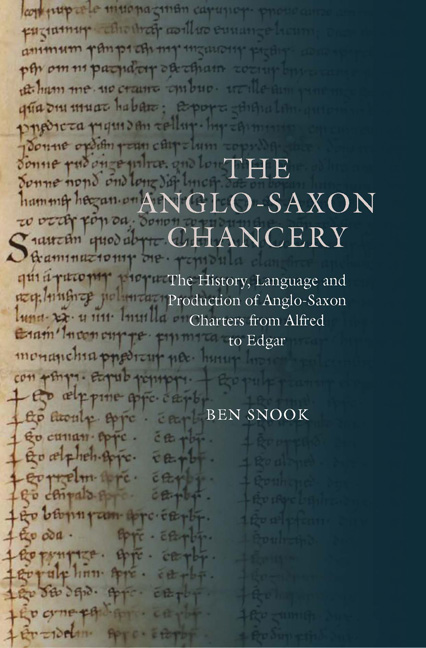 The Anglo-Saxon Chancery
The Anglo-Saxon Chancery Book contents
- Frontmatter
- Epigraph
- Contents
- Acknowledgements
- list of Abbreviations
- Timeline of Key Events between the Accession of Alfred and the Death of Edgar
- Introduction
- 1 Brave New World: The Charters of Alfred and Edward
- 2 Æthelstan
- 3 ‘Æthelstan A’
- 4 Turbulent Priests: Dunstan, Cenwald and Oda
- 5 Back to the Future: Edgar and ‘Edgar A’
- Conclusion
- Appendix I S 193
- Appendix II S 346
- Appendix III S 225
- Bibliography
- Index of charters
- Index
Conclusion
Published online by Cambridge University Press: 05 May 2015
- Frontmatter
- Epigraph
- Contents
- Acknowledgements
- list of Abbreviations
- Timeline of Key Events between the Accession of Alfred and the Death of Edgar
- Introduction
- 1 Brave New World: The Charters of Alfred and Edward
- 2 Æthelstan
- 3 ‘Æthelstan A’
- 4 Turbulent Priests: Dunstan, Cenwald and Oda
- 5 Back to the Future: Edgar and ‘Edgar A’
- Conclusion
- Appendix I S 193
- Appendix II S 346
- Appendix III S 225
- Bibliography
- Index of charters
- Index
Summary
The uniqueness of the Anglo-Saxon charter has always lain in its ability to torment both historians and critics of literature in equal measure with its strange style, curious claims and unusual appearance. At almost every moment in Anglo-Saxon history, the charter is there in the background not simply recording grants of land but also leading all kinds of folk, from the king to the royal dish-bearer, blinking into the historical light. yet, it cannot do so quietly: for almost every ‘unremarkable’ Anglo-Saxon charter, there is usually another, not so very far away, screaming out for attention. In the seventh century, when charters were first brought into service in England, the scribes who wrote them used an imposing, uncial script. on the face of it, this was a very odd habit: a fast, cursive script would have been much more fitting, not to mention more economical, for a charter. Yet, when set in context, the use of uncial makes perfect sense. In a society in which literacy was probably very rare, it was unlikely that many people would have been able to read the latin of the early Anglo-Saxon charters. By using uncial script, therefore, their scribes made these documents resemble high-value gospel books and thus ensured that they would absorb some of their unshakeable, numinous authority. Just by looking at one of these early charters, there could be no doubt that it was an important text which demanded respect. Whether or not they were aware of it, these scribes were doing something quite exceptional which set their diplomatic tradition apart somewhat from its continental counterparts. Anglo-Saxon charter scribes never lost that sense of individuality, and the texts they wrote are much the better for it. By the tenth century, the imposing, literary Latin in which they wrote was every bit as incongruous as the uncial script of the seventh century.
- Type
- Chapter
- Information
- The Anglo-Saxon ChanceryThe History, Language and Production of Anglo-Saxon Charters from Alfred to Edgar, pp. 189 - 194Publisher: Boydell & BrewerPrint publication year: 2015


